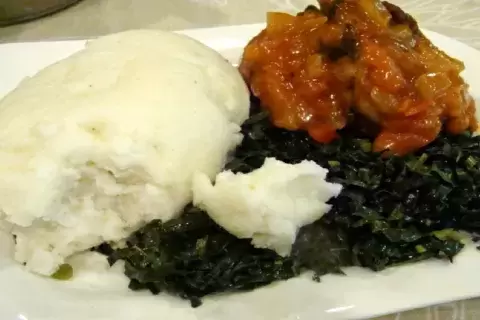Ugali is a staple food in many countries across East Africa, including Kenya, Tanzania, and Uganda. It is a simple yet hearty dish made from maize flour (cornmeal) and water.
Ugali is cooked by gradually adding maize flour to boiling water while continuously stirring until it thickens and forms a dense and dough-like consistency. The resulting ugali is then shaped into a round mound or served in individual portions.
Ugali is typically enjoyed as a side dish with various stews, vegetables, or meat dishes. Its neutral taste and dense texture make it a versatile accompaniment that complements a wide range of flavors.
Ugali not only provides sustenance but also represents a cultural and communal aspect of East African cuisine, where sharing a meal with loved ones and using one's hands to eat is a cherished tradition.
Introduction
Ugali, a beloved dish in East Africa, holds a special place in the hearts and kitchens of many households. This simple yet satisfying cornmeal dish is a versatile accompaniment to various savory stews and sauces.
In this food blog post, we'll dive into the essence of Ugali, sharing a traditional recipe, its cultural significance, and serving suggestions that will transport you to the vibrant flavors of East Africa.
Recipe of Ugali:
Ingredients
- 2 cups maize flour (also known as cornmeal or polenta)
- 4 cups water
- Salt (to taste)
Special Equipment Needed to prepare Ugali
- Large cooking pot
- Wooden spoon
Preparation of Ugali
- Begin by bringing the water to a rolling boil in a large cooking pot.
- While the water is heating, mix the maize flour with a little bit of water to make a smooth paste, ensuring there are no lumps.
- Once the water reaches a boil, reduce the heat to low. Gradually add the maize flour paste to the simmering water, stirring continuously with a wooden spoon.
- Keep stirring vigorously to prevent any lumps from forming. The mixture will thicken and become dense as the maize flour absorbs the water.
- Continue stirring and cooking for about 10-15 minutes, until the mixture forms a firm, stiff dough-like consistency.
- At this point, cover the pot with a lid and let it cook on low heat for an additional 5 minutes. This allows the steam to evenly cook the center of the Ugali.
- Remove the pot from the heat and let the Ugali sit covered for a few minutes to firm up.
- Finally, transfer the Ugali onto a large serving plate or board and shape it into a round or rectangular loaf. Use a wet spoon or knife to prevent sticking.
Serving Suggestions of Ugali
Ugali is typically enjoyed as a staple side dish in East Africa, often paired with rich and flavorful stews such as Sukuma Wiki (collard greens), Nyama Choma (grilled meat), or Kachumbari (tomato and onion salad).
It can also be served with sukuma wiki, sukuma wiki and a fried egg, or sukuma wiki and fish for a delicious and balanced meal. Traditionally, Ugali is eaten with the hands, breaking off a small piece and using it to scoop up the accompanying dish.
Nutritional Value of Ugali
Ugali is a nutrient-dense dish, providing a good source of carbohydrates, fiber, and energy. It is low in fat and cholesterol-free, making it a healthy choice. Additionally, maize flour used in it contains essential minerals like iron, magnesium, and phosphorus.
Cultural & Traditional Value of Ugali
Ugali is deeply rooted in the cultural and traditional fabric of East African communities. It represents unity, as it is often shared from a communal plate during meals or celebrations. In Kenya and Tanzania, it is considered a national dish and holds great cultural significance.
Preparing Ugali together is a social activity that brings families and friends closer, showcasing the importance of food and community.
Conclusion
Ugali is a humble yet flavorsome dish that embodies the rich culinary heritage of East Africa. Its simple preparation, combined with its ability to complement a wide range of dishes, has made it a beloved staple for generations.
So, gather your loved ones, embrace the cultural traditions, and savor the taste of Ugali – a true symbol of East African cuisine.














